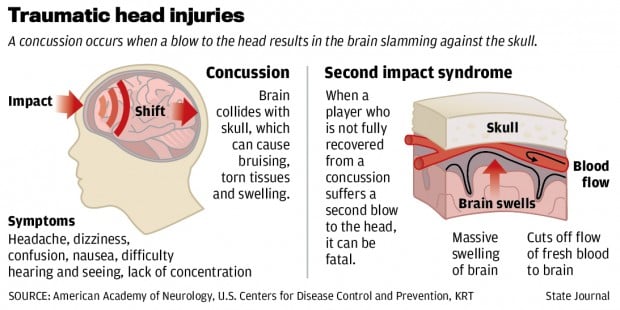
Every year more than 2 million people, a quarter of them children, end up in hospital emergency rooms with concussions — And those are the lucky ones! That's because there are millions more that postpone treatment or even worse, never get themselves examined simply because they don't experience the classic concussion symptoms that include vomiting, blurred vision, and loss of balance.
A 2014 survey of college football players revealed that for every single concussion that was reported over the course of their careers, four suspected concussions and 19 so-called "dings" went unreported! This is worrisome given that if left untreated, even the mildest concussion could result in long-term health issues like chronic headaches, memory loss, and depression. Also, given that the treatment is based on the external signs, doctors are often left guessing about the severity of the head injury.

This may change soon thanks to a simple blood test which can detect concussions, no matter how mild, for up to seven days after the incident. The test is the brainchild of a team of researchers led by Dr. Linda Papa, a medicine specialist at Orlando Health in Florida.
It entails looking for high levels of glial fibrillary acidic protein (GFAP), which resides in the glial cells that surround the neurons in the brain. Whenever an individual sustains a head injury, the proteins get released and enter the bloodstream, where they remain for up to seven days. Hence, it can enable doctors to accurately diagnose a concussion even when the patient is not examined immediately after the injury.

To verify the accuracy of the test, the team conducted several blood tests on over 600 patients, 18 years and older. About half had been diagnosed with concussions caused by car crashes, falls, sports, and other activities. The rest of the adults were suffering from fractures or some other non-brain trauma.
The researchers administered the first test within four hours after the patients were admitted and then periodically over the next seven days. Sure enough, they found evidence of not just GFAP but also another brain protein, UCH-L1, in the bloodstream of the patients diagnosed with concussions. The researchers also found that the more severe the injury, the higher the concentration of the proteins. When the scientists compared the test results with the patient's CT scans, they found that the blood test was able to accurately identify mild to moderate concussions 97% of the time.

Also, though the levels of the UCH-L1 protein declined within two days, the GFAP levels remained high for almost an entire week after the injury. This is very beneficial since patients often postpone visiting doctors for a few days in the hopes that the symptoms will disappear. While most concussions can be cured with some rest from physically and mentally challenging activities, some severe cases require neurological testing or other medical treatment.
The researchers who published their findings in the science journal, JAMA Neurology on March 28 say further studies need to be done before the blood test can be approved for general use. However, it is being hailed as a substantial leap in the diagnoses of this often overlooked injury. Dr. Linda Papa is also working with Royal Philips to build a handheld device that will be able to test blood at the scene of the injury and display the level of proteins within minutes!
Resources: bendbulletian.com, gizmag.com, claimsjournal.com